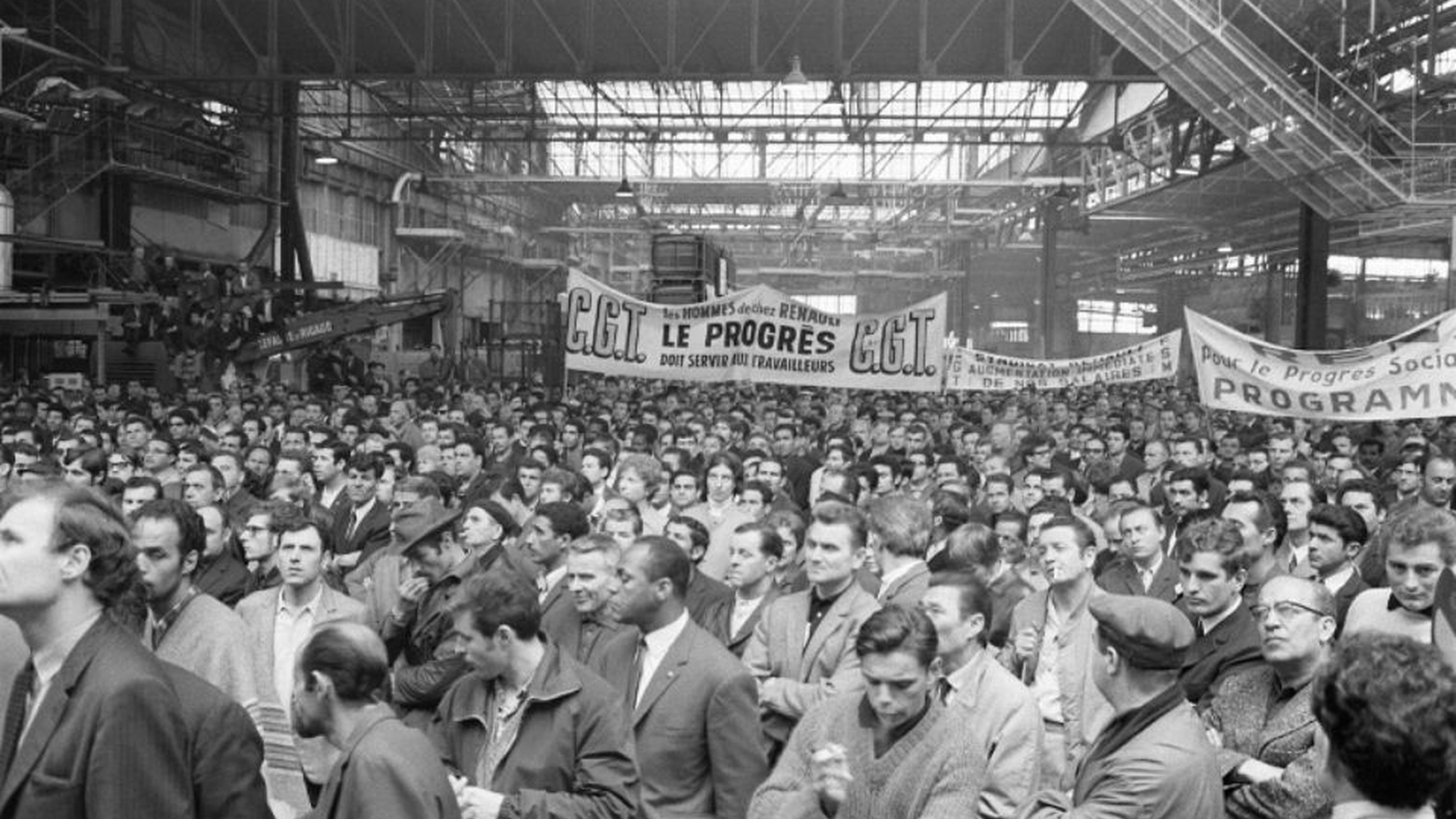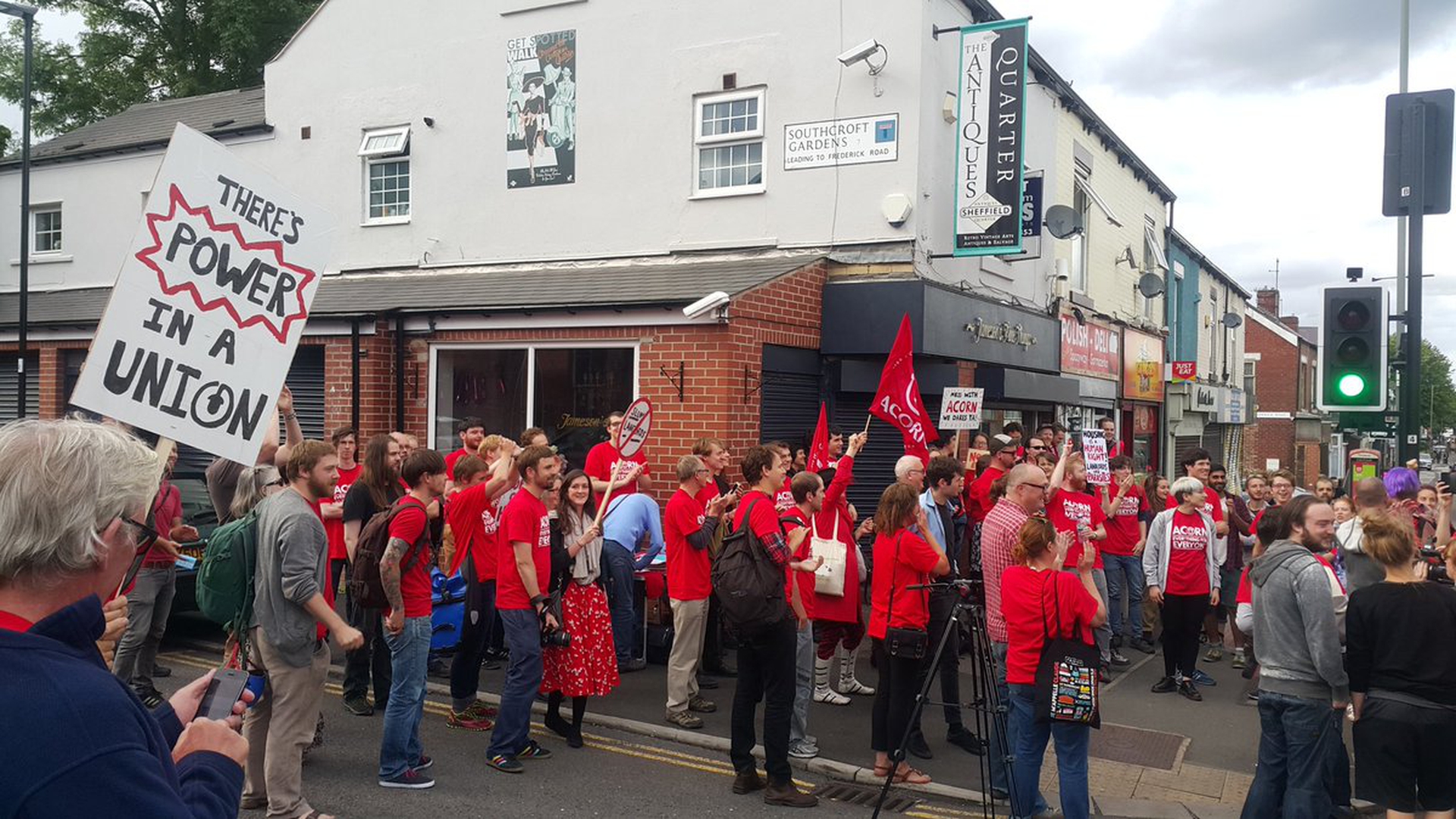The Worker and the Union: Issue 3 Editorial
by
Notes from Below (@NotesFrom_Below)
August 16, 2018
Featured in The Worker and The Union (#3)
An introduction to the issue

theory
The Worker and the Union: Issue 3 Editorial
by
Notes from Below
/
Aug. 16, 2018
in
The Worker and The Union
(#3)
An introduction to the issue
This issue of Notes from Below focuses on ‘The Worker and the Union’. We see this as building on the central push of our first issue, which explored the primacy of working class experience for developing strategies that can meet the challenges currently facing revolutionary socialists. This issue extends our emphasis on the workers’ inquiry method to orientate this task.
We chose to focus on the ‘Worker and the Union’ because unions (be they craft, industrial or otherwise) have traditionally been seen as the key organisational form of workers power. Starting in the workplace, they are the base upon which workers have historically levelled collective power and developed their political imagination.
This issue comes at a time when that collective power is at a relatively low ebb. The defining trend of the last four decades has been the steep decline in worker self-organisation in the forms of both formal trade unionism and strike action. An International Labour Organisation study showed strike action across 38 countries declined by 80% between the 1970s and the 2000s1. In Europe, research from the European Trade Union Institute shows that the 15 core nations of the EU saw a 40% drop in strikes between the 1990s and the 2000s2. In the UK specifically, the number of working days lost to strike action hit an all-time low in 2017 3. The Trade Union Congress’ internal analysis regarding union decline makes for grim reading.
Despite this overall slump, there is still conflict at work - sometimes taking place inside, and often outside of the trade union movement. Resistance has not gone away, but the context in which it takes place is unavoidably significant.
In order to address the changing needs of workers’ organisation, the issue returns to the idea of class composition. It asks how forms of workers’ organisation are changing in response to the technical, social and political transformations that affect the nature of contemporary working class life. What we are interested in here, in class composition terms, is the leap from technical and social recomposition to political recomposition. By this, we mean the ways in which workers are finding to resist and organise in different conditions - be they official or unofficial, in the workplace or in the community.
The only way out of this ongoing decline in working class self-organisation is a process of rank-and-file recomposition. Without it, socialism will remain nothing but an abstract utopia in an concretely dystopian world. So, socialist strategy necessitates a serious and clear headed approach to this recomposition. How likely does it seem? What are its initial outlines? What can we do to to push it forwards?
To this end, we are very pleased to present Issue 3 of Notes from Below, The Worker and The Union.
Amazon: A pivot of the new class composition
While the mainstream media has given increasing attention to the grim conditions of Amazon workers concomitant to the wealth of Jeff Bezos, it has largely portrayed workers as powerless victims of the e-commerce giant and neoliberal deregulation. The first two contributions to this issue turn this discourse on its head by looking at Amazon strategically, highlighting the potential power of workers and critically assessing union initiatives to organise them.
In A Union at Amazon?, an Amazon worker in the United States reflects on the strategic point of the company in the global economy and the new social composition it has created. Looking at the limits of union campaigns in a high-turnover sector with a lack of solidarity, he argues for the creation of regional Worker and Tenant Leagues based on direct action and mutual aid.
Alessandro Delfanti’s Amazon is the New FIAT gives us an incisive analysis of an Amazon Fulfilment Centre in Piacenza (Italy). Drawing on Romano Alquati’s inquiry into FIAT in the 1960s, the article paints the politics of the shop floor, the shaping of the new working class and its potential to organise.
Couriers: Self-organisation against platform capitalism
The self-organisation of couriers has developed rapidly over the last three years. These workers do dangerous and precarious work for low wages, and often have to deal with advanced technical compositions which are designed to disempower and exploit them. But across the UK, they’ve fought back regardless, leading a wave of struggles in platform capitalism.
In “Without our brain and muscle not a single wheel can turn”: The IWW Couriers Network Chris Fear explores the work the IWW have done to organise with food platform workers outside of London and the South East, and explains how their network model is beginning to deliver concrete results for workers.
In The Workers Will See You Now Jim Benfield inquires into the development of an IWGB Couriers and Logistics Branch campaign. Workers at The Doctors Laboratory have pursued legal methods in order to improve their conditions and open the way for direct action down the line, developing an increasing level of class consciousness in the process.
The Rebel Roo was a monthly workers’ bulletin written for and by Deliveroo workers, produced across 2016-18. At its peak, it’s combined online and offline circulation reached c.1,500 a month. The editors have collected all of the issues produced during that time, in order to give a sense of the scale and development of the Deliveroo workers’ struggle.
Renters’ Unions and Housing: Social Recomposition
Workers aren’t only exploited in the workplace. As the housing crisis grows ever deeper, more and more people are organising around points of antagonism beyond production. New organisations that aim to unionise renters are growing rapidly.
In Taking What’s Ours: An ACORN Inquiry, Callum Cant investigates the history and strategy of the biggest of these new renters’ unions, ACORN. What is community syndicalism, how does it work on a day-to day basis, and what role can it play in an ongoing process of rank-and-file recomposition? Two issues of the ACORN Bulletin are now available online too.
In Chicken or Egg, Political Education and Working-class Power, Rohan Kon demystifies ‘political education’, reflects on Alinskyism, and presents ACORN’s political method of class struggle community organising.
The republished Territorial Inquiry: Living Rent public walk in Partick and Whiteinch, produced by members of the Living Rent union in Glasgow, investigates the local situation in a couple of Glasgow neighbourhoods and experiments with the method of workers’ inquiry in housing.
In Housing Maintenance Workers: Organising to Win, Imogen Woods and Ian Allinson interview Billy Nugent, the shop steward who led the recent victorious Mears housing workers strike, about organising indebted workers, organic leadership, fighting a Labour council and how ‘It all came down to communication and organization’.
International: The many forms of worker organisation
Working class political recomposition takes countless shapes. As the following contributions show us, these forms are always determined by the development of class composition in a particular context.
Joe Buckley’s No union, no problem: anatomy of a Vietnamese wildcat is a gripping account of a recent wildcat strike at a shoe factory in Vietnam, reminding us of the persistence of working class struggle outside of the union form.
While history never really repeats itself, it has a tendency to rhyme. In Factories, Fields and Firearms, Jessica Thorne interviews historian Chris Ealham, probing into the history of the great militant trade union, the Spanish CNT.
In The travails of organizing an alternative union in Ireland, Paul Stewart, Tommy McKearney, and Brian Garvey discuss the attempt to build an independent workers’ union in Ireland. Across the North and South, the piece situates the struggle to organise against the backdrop of the Troubles and the later sectarian welfare state, drawing attention to the particular social composition in Ireland.
Hospitality: Striking with a smile
The hospitality industry has seen prominent strikes at TGI Fridays and McDonalds recently, with campaigns and further strike action looking likely to continue at both companies. An expanding wave of strike action in the hospitality sector seems to be a distinct possibility.
Joe Kearsey’s Camaraderie, affective labour and the union is a workers’ inquiry into hospitality. In the piece, he examines the labour process of hospitality work, how it creates sociality among workers and how this affinity lays the groundwork for resistance.
In Brand Damage: Better Than Zero and the Conditions of Company Fear, Cailean Gallagher and Sarah Collins discuss the building of a solidary network amongst hospitality, fast food, and customer service workers in Scotland. They critically reflect on the tactics and strategy of the campaign, connecting it to the challenges of organising workers in Scotland today.
Unions and the disorganised
In Troublemakers or insurance sellers? Daniel Randall discusses the role of RMT on the underground in London. He argues that rather than posing itself as an organisation external to workers, offering a “service” to its members, the union should train reps to be “troublemakers”: shop floor leaders, agitators and organisers.
Jamie Woodcock sat down with Declan, the lead organiser of Game Workers Unite in the UK, to discuss the prospects for organising the videogames industry. As part of a global campaign to organise workers in the videogames industry, the interview examines why it is happening now, what the grievances are, and where it goes next in the UK.
In Breaking the Chain: Building Worker Power under Monopoly Capitalism, Hettie O’Brien argues that “breaking the monopolies” is no solution for workers under contemporary capitalism. By looking at the choke points of the present system and past examples of resistance, she shows how power can be built from below.
For Human Shields and Supermarket Managers, Max O’Donnell Savage reflects on the way ‘responsive’ human resource management uses internal labour markets and individualised welfare schemes to break up the embryonic solidarity between supermarkets workers.
In An introduction to Wobbly: an app for 21st century workers’ power, John Evans explains an ongoing project to develop an organising app, Wobbly, which can span the gaps between decentralised workers, and develop a techno-syndicalism adequate to the composition of the class today.
In Working-class internationalism and the aid worker, Nazim Daradia reflects on the weakness of organised labour in the international aid sector and highlights the possibility of a genuine internationalist movement in solidarity with people in the global south.
Higher Education: The Return of the Rank-and-File
2018 saw a four-week university strike over pensions. The strike began as a top-down initiative, but the emergence of the rank-and-file as an independent actor in the strike rapidly changed the balance of class forces.
In Anti-casualisation in practice: a podcast on the Fractional For Fair Play campaign at SOAS, Sai Englert, Carrie Benjamin and Nithya Natarajan reflect on the experience of organising rank-and-file precarious academic workers before the 2018 strike, and how unofficial on-the-job action turned the tables on university management.
In the making of The University Worker, Jamie Woodcock, Lydia Hughes, Callum Cant, Jessica Thorne and Seth Wheeler discuss the strike itself. The podcast covers why they collaborated on writing and distributing a rank-and-file bulletin during the USS dispute. They reflect on the strengths and weaknesses of the project, as well as discussing what can be learned for other bulletins.
What next?
As we explained in the original call for submissions, we want this issue to be an opportunity to reflect on organising in different forms, with an emphasis on how this can inform future struggles. We welcome feedback and responses to the pieces in the issue.
The next step is to continue developing the themes of this issue through focused inquiries in particular industries and sectors. We are therefore moving towards a shorter (and hopefully more frequent) issue format that can experiment with workers’ inquiry in a more sustained way. In order to do this, however, we need more resources. We have set up a Patreon page where supporters can donate to the ongoing project.
Finally, the editors would also like to thank all of the contributors to issue 3, as well as Evening Class for designing the banner image.
-
L.J. Perry and Patrick J. Wilson. 2004. Trends in Work Stoppages: A Global Perspective. International Labour Organisation: Geneva. ↩
-
Kurt Vandaele. 2011. Sustaining or Abandoning Social Peace? European Trade Union Institute: Brussels. ↩
-
Office for National Statistics. 2017. Labour Disputes in the UK . ↩
Featured in The Worker and The Union (#3)
author
Notes from Below (@NotesFrom_Below)
Subscribe to Notes from Below
Subscribe now to Notes from Below, and get our print issues sent to your front door three times a year. For every subscriber, we’re also able to print a load of free copies to hand out in workplaces, neighbourhoods, prisons and picket lines. Can you subscribe now and support us in spreading Marxist ideas in the workplace?
Read next

A Union at Amazon?
by
Marvin Harvey
/
Aug. 16, 2018

